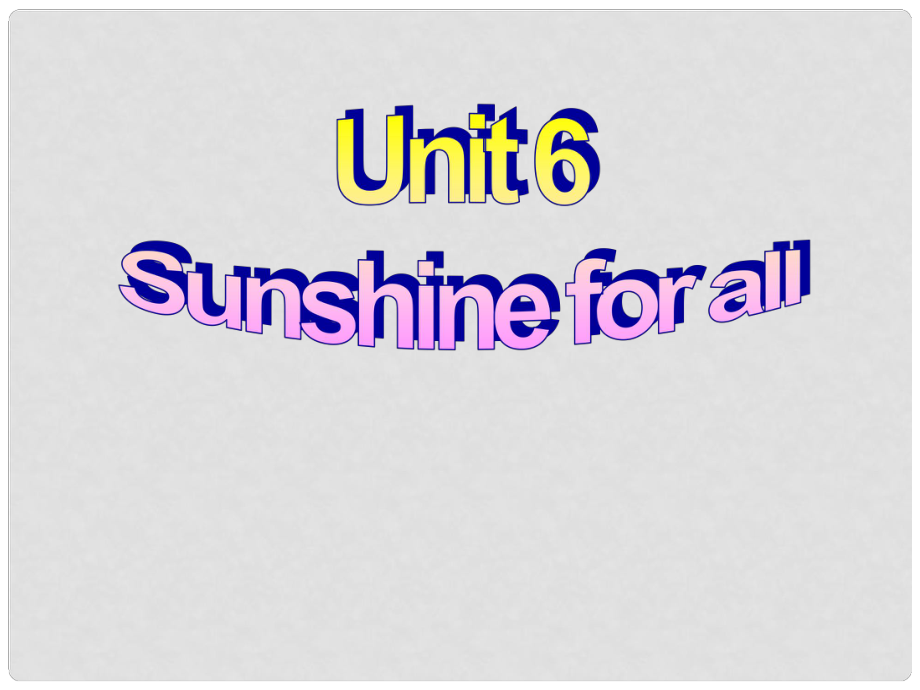《江蘇省鹽城市永豐初級(jí)中學(xué)八年級(jí)英語下冊(cè) Unit 6 Sunshine for all課件 (新版)牛津版》由會(huì)員分享���,可在線閱讀�����,更多相關(guān)《江蘇省鹽城市永豐初級(jí)中學(xué)八年級(jí)英語下冊(cè) Unit 6 Sunshine for all課件 (新版)牛津版(29頁珍藏版)》請(qǐng)?jiān)谘b配圖網(wǎng)上搜索。
1�����、We should support our national athletes at the Olympic Games.the Olympic Games = the Olympicsblind adj. 盲的We should help blind people cross the road.deaf adj. 聾的聾的Deaf people can talk with hand language.disabled adj. 殘疾的殘疾的It is difficult for disabled people to go upstairs.elderly adj. 年老的年老的The eld
2����、erly should be taken good care of.homeless adj. 無家可歸的無家可歸的Homeless people have nowhere to live.meaningful adj. 有意義的有意義的Volunteers ususlly do meaningful things.train n. 訓(xùn)練;培訓(xùn)訓(xùn)練���;培訓(xùn)So we should train more volunteers to help more people.Have you ever been a volunteer?Have you ever helped people who need
3��、 help?The Class 1, Grade 8 students have found some pictures of people who need help. Write the correct words under them. Then put a tick in the boxes if you have ever helped these people.People who need helpa _ persona _ persondisabledpoorblind, deaf, disabled, elderly, homeless, poora _ personan _
4���、 personelderlyhomeless_ peopledeafa _ personblindAmy and Daniel are talking about people who need help. Listen to the recording and answer the following question: How can we help homeless people?Give them food and clothes.Write to the local government.Work in pairs and discuss the people in Part A.
5����、Use the conversation below as a model.Amy: What are homeless people, Daniel?Daniel: Homeless people dont have their own places to live.Amy: How can we help homeless people?Daniel: We can give them food and clothes.Amy: Are there any other ways to help them?Daniel: Yes. We can write to the local gove
6�����、rnment. They can provide special places for homeless people to stay.Would Eddie and Hobo like tohelp people in need?LISTEN AND ANSWER THE QUESTIONS.What is Hobo doing?Will Eddie support him?How does Hobo want Eddie to help?He is training to be a volunteer for the Olympic Games.Yes, he will.He needs
7����、some more food to eat at work.1. Im training to be a volunteer for the Olympic Games. train v. 訓(xùn)練;培訓(xùn)訓(xùn)練�����;培訓(xùn) e.g. If you train hard, youll make a good footballer. 你要刻苦訓(xùn)練就能成為優(yōu)秀的足你要刻苦訓(xùn)練就能成為優(yōu)秀的足球運(yùn)動(dòng)員����。球運(yùn)動(dòng)員。2. Its meaningful to do something for the Olympics. Its meaningful to do sth. for sb. 為某人做某事是有意義的為某人做某
8��、事是有意義的 e.g. Its meaningful to do something for children in poor areas. 為貧困地區(qū)孩子做些事是很有意義為貧困地區(qū)孩子做些事是很有意義 的�。的。3. I want you to help me. want sb. to do sth. 想要某人做某事想要某人做某事 e.g. Parents want us to study hard everyday. 父母想要我們每天努力學(xué)習(xí)���。父母想要我們每天努力學(xué)習(xí)�����。4. I need some more food to eat at work. (1) need sth to do st
9���、h 需要某物來做某事需要某物來做某事 e.g. I need some tools to finish the work. 我需要一些工具來完成這份工作�����。我需要一些工具來完成這份工作�。 (2) some more food 更多一些食物更多一些食物 數(shù)量意義詞數(shù)量意義詞+more+名詞名詞: 表更多表更多 e.g. two more apples 再兩個(gè)蘋果再兩個(gè)蘋果 5. Homeless people dont have their own places to live. to live:動(dòng)詞不定式做定語修飾前面:動(dòng)詞不定式做定語修飾前面的名詞���。的名詞。 e.g. have somethi
10��、ng to eat 有一些吃的東西有一些吃的東西6. They can provide special places for homeless people to stay. provide sth for sb 為某人提供某物為某人提供某物 =provide sb. with sth. e.g. He was very poor because hed to provide food for seven children. 他很窮���,因?yàn)樗o七個(gè)孩子提供他很窮���,因?yàn)樗o七個(gè)孩子提供 食物。食物��。I. Complete the sentences.1. Its _ (mean) to hel
11、p people in need.2. My father needed a pair of scissors _ (cut) out some pieces of cards.3. I dont have enough money _ (go) travelling.4. He is a _ (able) person. He lost one of his legs in a car accident.meaningfulto cutto godisabledII. Translate the following sentences.1. 我們?cè)鯓訋椭と四?�?我們?cè)鯓訋椭と四兀?. 工作
12��、時(shí)我需要更多一些食物吃��。工作時(shí)我需要更多一些食物吃�����。3. 我正在訓(xùn)練成為奧林匹克的一名志愿者���。我正在訓(xùn)練成為奧林匹克的一名志愿者���。How can we help blind people?I need some more food to eat at work.I am training to be a volunteer for the Olympic Games.4. 為奧林匹克做些事情很有意義。為奧林匹克做些事情很有意義�。5. 有沒有其他的辦法幫助老人?有沒有其他的辦法幫助老人���?Its meaningful to do something for the Olympics.Are there any other ways to help the elderly?Recite the dialogue between Eddie and Hobo.
 江蘇省鹽城市永豐初級(jí)中學(xué)八年級(jí)英語下冊(cè) Unit 6 Sunshine for all課件 (新版)牛津版
江蘇省鹽城市永豐初級(jí)中學(xué)八年級(jí)英語下冊(cè) Unit 6 Sunshine for all課件 (新版)牛津版

